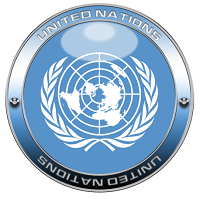The latest report on the oil-for-food program at the United Nations and a guilty plea by a procurement officer provide the most troubling evidence yet of criminality at the U.N. 
Oil-for-Food is the biggest scandal ever to hit the United Nations (search), but it is just one of many scandals erupting at the world body – all symptoms of trouble at the core. 
Crime, Incompetence, Un
NEW YORK — It began as a U.N. humanitarian aid program called "Oil-for-Food," but it ended up with Saddam Hussein (search) pocketing billions to become the biggest graft-generating machine ever and enriching some of America's most forceful opponents at the United Nations (search).
Plus, some evidence suggests that some of the money ended up in the hands of potential terrorists who are opposed to the United States.
NEW YORK — What started as a plan to get humanitarian aid to Iraqis living under Saddam Hussein's regime became what critics call a multi-billion dollar boondoggle: It's the Oil-for-Food (search) program that was run by the United Nations from late 1996 to last year.
Crime, Financial, Un, Corruption, Convict
A former United Nations procurement official was convicted Thursday of charges that he helped a friend secure $100 million in U.N. contracts in exchange for a huge discount on two luxury Manhattan apartments and cash. Sanjaya Bahel, 57, chief of the U.N.'s Commodity Procurement Section from 1999 to 2003, had maintained his innocence since his November arrest.
Crime, Financial, Un, Corruption, Convict
One of the targets of the Oil-for-Food investigation, Alexander Yakovlev (search), on Monday pleaded guilty to conspiracy, wire fraud and money laundering charges for taking bribes during his work at the United Nations. Yakovlev also admitted to soliciting a bribe under Oil-for-Food, making him the first U.N. official to face criminal charges in connection with the scandal-tainted program aimed at helping ordinary Iraqi citizens.
Crime, Financial, Fraud, Un, Corruption
Sanjaya Bahel, 57, was taken into custody in the Manhattan federal courtroom following the verdict and faces up to 20 years in prison for four counts of fraud, five years for one count of conspiracy and 10 years on one charge of accepting corrupt payments. U.N. Secretary-General Ban Ki-moon said he was "satisfied that justice has been done."
Crime, Financial, Un, Greed, Corruption, Convict
A former U.N. procurement officer pleaded guilty Monday to accepting hundreds of thousands of dollars in bribes from U.N. contractors, federal prosecutors said.
Alexander Yakovlev also admitted to soliciting a bribe under the U.N. oil-for-food program, making him the first U.N. official to face criminal charges in connection with the scandal-tainted program for Iraq.
He pleaded guilty to all three counts in the indictment — wire fraud, conspiracy to commit wire fraud and money laundering — and could face up to 20 years in prison for each of the charges, the U.S. Attorney’s Office said in a statement.
Crime, Financial, Un, Corruption
One of the targets of the U.N. Oil-for-Food investigation, Alexander Yakovlev (search), was stripped of his diplomatic immunity Monday and taken into custody by federal authorities, a U.N. spokesman announced.
Crime, Character, Un, Corruption
Benon V. Sevan, former director of the scandal-plagued Oil-for-Food Program, has left his home in New York and is now in his native Cyprus, say U.N. officials.
Crime, Un, Corruption
According to media reports, the United Nations' own internal judicial body, the Administrative Tribunal (UNAT), has ordered the U.N. to pay "all reasonable legal fees" to Benon Sevan, the disgraced former chief of the disastrous Iraqi Oil-for-Food Program.
Crime, Un, Corruption
Former U.N. Oil-for-Food chief Benon Sevan has been indicted in New York federal court for allegedly taking bribes under the program from Saddam Hussein's regime, U.S. authorities announced Tuesday. The charges, detailed in a joint press release by the FBI, the U.S. Attorney's office and the Manhattan district attorney, came over a year after former Federal Reserve Chairman Paul Volcker completed an investigation for the United Nations into the massively corrupted Oil-for-Food program that operated in Saddam's Iraq between 1996 and 2003.
Financial, Un, Corruption
The independent inquiry committee, which began its work in 2004, said in an earlier report that the program became deeply corrupted as Saddam arranged for surcharges and kickbacks while an overwhelmed UN headquarters failed to exert administrative control over the program. In its report issued in September, the inquiry committee found there were isolated cases of corruption by UN officials, including the head of the office overseeing the program, Benon V. Sevan.













